
Richard Spurr 1am - 4am
9 June 2024, 21:24

The two mainstream and pro-European groups, the conservatives and the socialists, lost a few seats but remained the dominant forces.
Far-right parties have made big gains at the European Parliament as the Greens took a major hit at Sunday’s European elections, according to a first projection provided by the European Union.
The estimates aggregated by the EU parliament are based on exit polls or other survey data, along with projections that may include some partial election returns.
The two mainstream and pro-European groups, the Christian Democrats and the Socialists, remained the dominant forces.
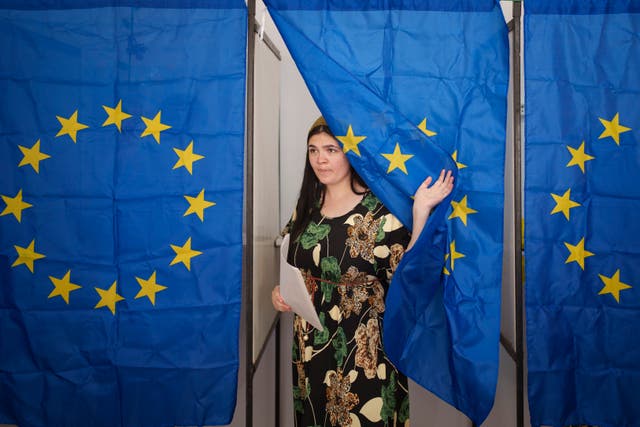
The Greens were expected to lose about 20 seats and fall back to sixth position in the legislature.
The party of Marine Le Pen dominated the polls in France, with her National Rally party standing at just over 30% or about twice as much as President Emmanuel Macron’s pro-European centrist party that is projected to reach around 15%.
In Germany, the most populous nation in the 27-member bloc, projections indicated that the extreme right Alternative for Germany (AfD) overcame a string of scandals involving its top candidate to rise to 16.5% from 11% in 2019 and become the second biggest party.
In comparison, the combined result for the three parties in the German governing coalition barely topped 30%.
“After all the prophecies of doom, after the barrage of the last few weeks, we are the second strongest force,” said AfD leader Alice Weidel.
The European Union, which has its roots in the defeat of Nazi Germany and fascist Italy, kept the hard right to the fringes of politics for decades.
With its strong showing in these elections, the far right could now become a major player in policies ranging from migration to security and climate.
In sharp contrast, the Greens were predicted to fall from 20% to 12% in Germany, a traditional bulwark for environmentalists, with more losses expected in France and several other EU nations.
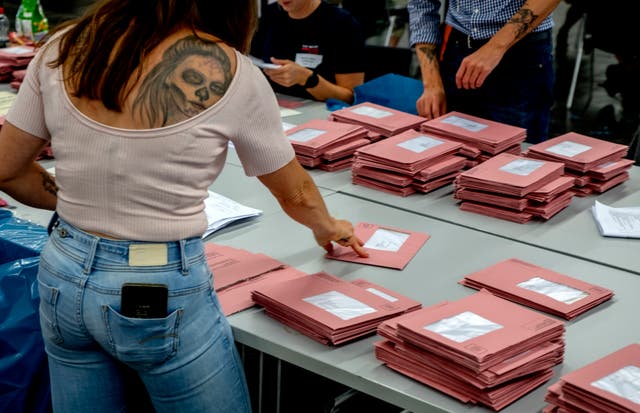
Their defeat could well have an impact on the EU’s overall climate change policies, still the most progressive across the globe.
The centre-right Christian Democratic bloc of EU Commission president Ursula von der Leyen, which already weakened its green credentials ahead of the polls, dominated in Germany with almost 30%, beating the Social Democratic party of Chancellor Olaf Scholz, which fell to 14%, even behind the AfD.
“What you have already set as a trend is all the better – strongest force, stable, in difficult times and by a distance,” Ms von der Leyen told her German supporters by video link from Brussels.
As well as France, the hard right, which focused its campaign on migration and crime, was expected to make significant gains in Italy, where Premier Giorgia Meloni was tipped to consolidate her power.
Voting will continue in Italy until late in the evening and many of the 27 member states have not yet released any projections.
Nonetheless, data already released confirmed earlier predictions: the EU’s massive exercise in democracy is expected to shift the bloc to the right and redirect its future.
With the centre losing seats to hard right parties, the EU could find it harder to pass legislation and decision-making could at times be paralysed in the world’s biggest trading bloc.
“I do hope that we will manage to avoid a shift to the right and that Europe will somehow remain united,” voter Laura Simon said in Berlin.
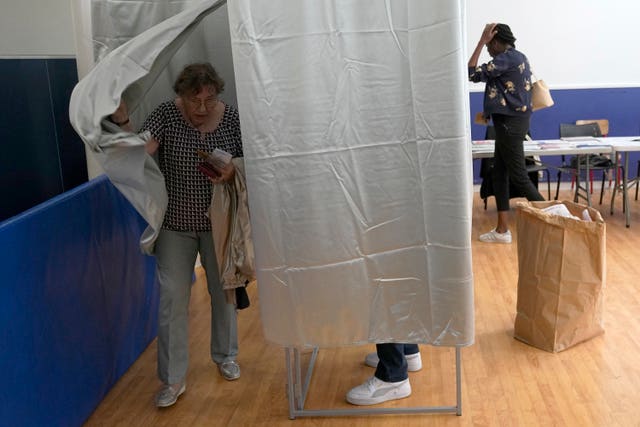
EU legislators, who serve a five-year term in the 720-seat parliament, have a say in issues from financial rules to climate and agriculture policy.
They approve the EU budget, which bankrolls priorities including infrastructure projects, farm subsidies and aid delivered to Ukraine.
And they hold a veto over appointments to the powerful EU commission.
These elections come at a testing time for voter confidence in a bloc of some 450 million people.
Over the last five years, the EU has been shaken by the coronavirus pandemic, an economic slump and an energy crisis fuelled by the biggest land conflict in Europe since the Second World War.
But political campaigning often focuses on issues of concern in individual countries rather than on broader European interests.
Sunday’s voting marathon winds up a four-day election cycle that began in the Netherlands on Thursday.
An unofficial exit poll there suggested that the anti-migrant hard right party of Geert Wilders would make important gains, even though a coalition of pro-European parties has probably pushed it into second place.
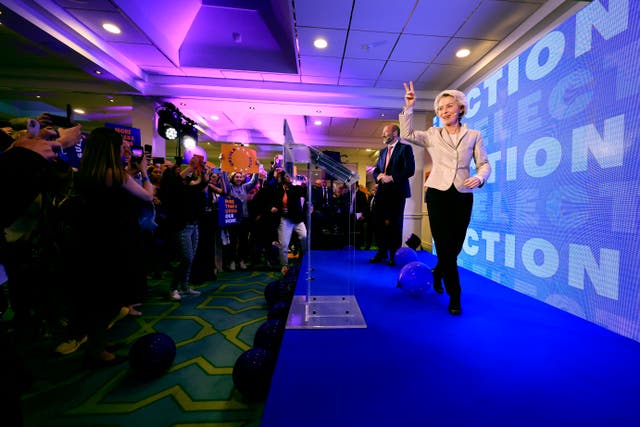
Casting his vote in the Flanders region, Belgian Prime Minister Alexander De Croo, whose country holds the EU’s rotating presidency until the end of the month, warned that Europe was “more under pressure than ever”.
Since the last EU election in 2019, populist or far-right parties now lead governments in three nations – Hungary, Slovakia and Italy – and are part of ruling coalitions in others including Sweden, Finland and, soon, the Netherlands.
Polls give the populists an advantage in France, Belgium, Austria and Italy.
“Right is good,” Hungarian Prime Minister Viktor Orban, who leads a stridently nationalist and anti-migrant government, told reporters after casting his ballot.
“To go right is always good. Go right!”
After the election comes a period of horse-trading, as political parties reconsider their places in the continent-wide alliances that run the European legislature.
The biggest political group – the centre-right European People’s Party (EPP) – has moved further right during the present elections on issues such as security, climate and migration.
Among the most watched questions is whether the Brothers of Italy – the governing party of populist Ms Meloni, which has neo-fascist roots – stays in the more hard-line European Conservatives and Reformists group or becomes part of a new hard right group that could form in the wake of the elections.
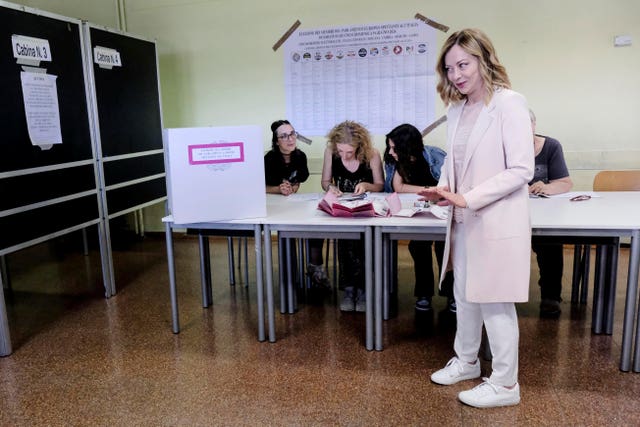
Ms Meloni also has the option to work with the EPP.
A more worrying scenario for pro-European parties would be if the ECR joins forces with Ms Le Pen’s Identity and Democracy group to consolidate hard-right influence.
The second biggest group – the centre-left Socialists and Democrats – and the Greens refuse to align themselves with the ECR.
Questions also remain over what group Mr Orban’s ruling Fidesz party might join.
It was previously part of the EPP but was forced out in 2021 due to conflicts over its interests and values.
The far-right Alternative for Germany was kicked out of the Identity and Democracy group following a string of scandals surrounding its two lead candidates for the European Parliament.
The election also ushers in a period of uncertainty as new leaders are chosen for the European institutions.
While legislators are jostling over places in alliances, governments will be competing to secure top EU jobs for their national officials.
Chief among them is the presidency of the powerful executive branch, the European Commission, which proposes laws and watches to ensure they are respected.
The commission also controls the EU’s purse strings, manages trade and is Europe’s competition watchdog.
Other plum posts are those of European Council president, who chairs summits of presidents and prime ministers, and EU foreign policy chief, the bloc’s top diplomat.